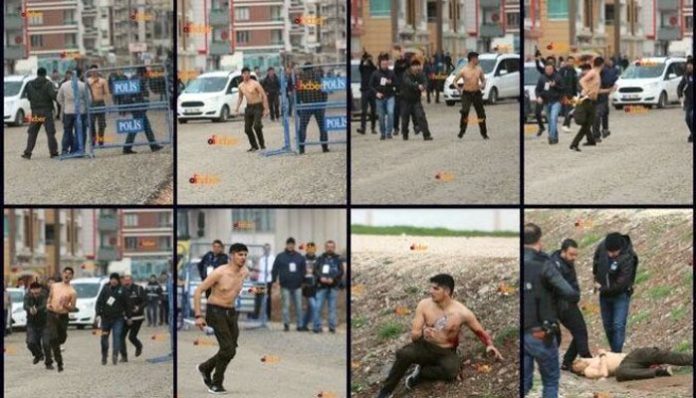A Turkish court has acquitted police officer Yakup Şenocak, who shot a Kurdish university student Kemal Kurkut to death during Nevruz celebrations in the southeastern province of Diyarbakır in 2017, the Stockholm Center for Freedom reported.
A regional appeals court ruled in March that no charges can be leveled against Şenocak because the student’s killing took place “within the framework of the law” and ordered a retrial.
The Diyarbakır 7th High Criminal Court on Tuesday ruled in line with the regional appeals court that there are “no grounds for punishment.”
Kurkut, 23, was killed when a police officer opened fire on him after he quarreled with law enforcement at a checkpoint when he was trying to get into the festival venue on March 21, 2017, photos taken during the incident showed.
Kurkut was a student at İnönü University in eastern Turkey’s Malatya province and had traveled to his hometown of Diyarbakır for Nevruz celebrations. Police found poetry books and clothing in Kurkut’s backpack after he was shot on suspicion that he was a “suicide bomber.”
The police officer, Şenocak, was suspended and tried on charges of murder, facing a life sentence. He was not put in pretrial detention and was reinstated to his job three months after the incident. Conflicting forensic reports were presented during the trial, some of which said Kurkut was killed by a bullet that ricocheted off the ground, while others said he was killed by a bullet fired from Şenocak’s gun. In November 2017 the police officer was acquitted of the charges due to a lack of evidence.
When the lawyers for Kurkut’s family challenged the local court’s decision to acquit at the Diyarbakır regional appeals court, the appeals court decided to reverse the lower court’s ruling on Şenocak, not because the lower court’s acquittal decision was wrong but because it was not well grounded.
The appeals court said it was a failure on the part of the local court not to justify the police officer’s acquittal based on whether Kurkut’s killing was legal or not.
In a March 2022 hearing, the court said Kurkut’s killing took place within the framework of the law under the 24th article of the Turkish Penal Code (TCK), which suggests that a person enforcing the law cannot also be punished under the law on the duties of the police, which grants them the authority use force and lethal force in certain cases.
The court said the killing of a person when their appropriate detention or prevention from fleeing are not possible cannot be considered a violation of the right to life.
During the hearing on Tuesday, lawyers for the Kurkut family once more demanded that the police officer be punished for his intent to kill.
The court, on the other hand, followed the decision to overturn the appeal and ruled that no punishment need be imposed on Şenocak.
The 9th Criminal Chamber of the Diyarbakır Regional Court recently upheld the conviction of photojournalist Abdurrahman Gök, who took pictures of Kurkut when he was shot to death by Şenocak, on charges of “disseminating terrorist propaganda.”
Gök was sentenced to one-and-a-half years in prison, although his lawyer says the verdict will be appealed at the Supreme Court of Appeals.
The photos from Gök’s camera were crucial in refuting claims made by the Diyarbakır Governor’s Office following the incident that Kurkut had been shot on suspicion of wearing a suicide vest.
They showed a bare-chested Kurkut approaching a police checkpoint with a knife and a water bottle in his hands, then running past police barricades with several officers chasing after him before finally getting shot in the back and falling to the ground.


